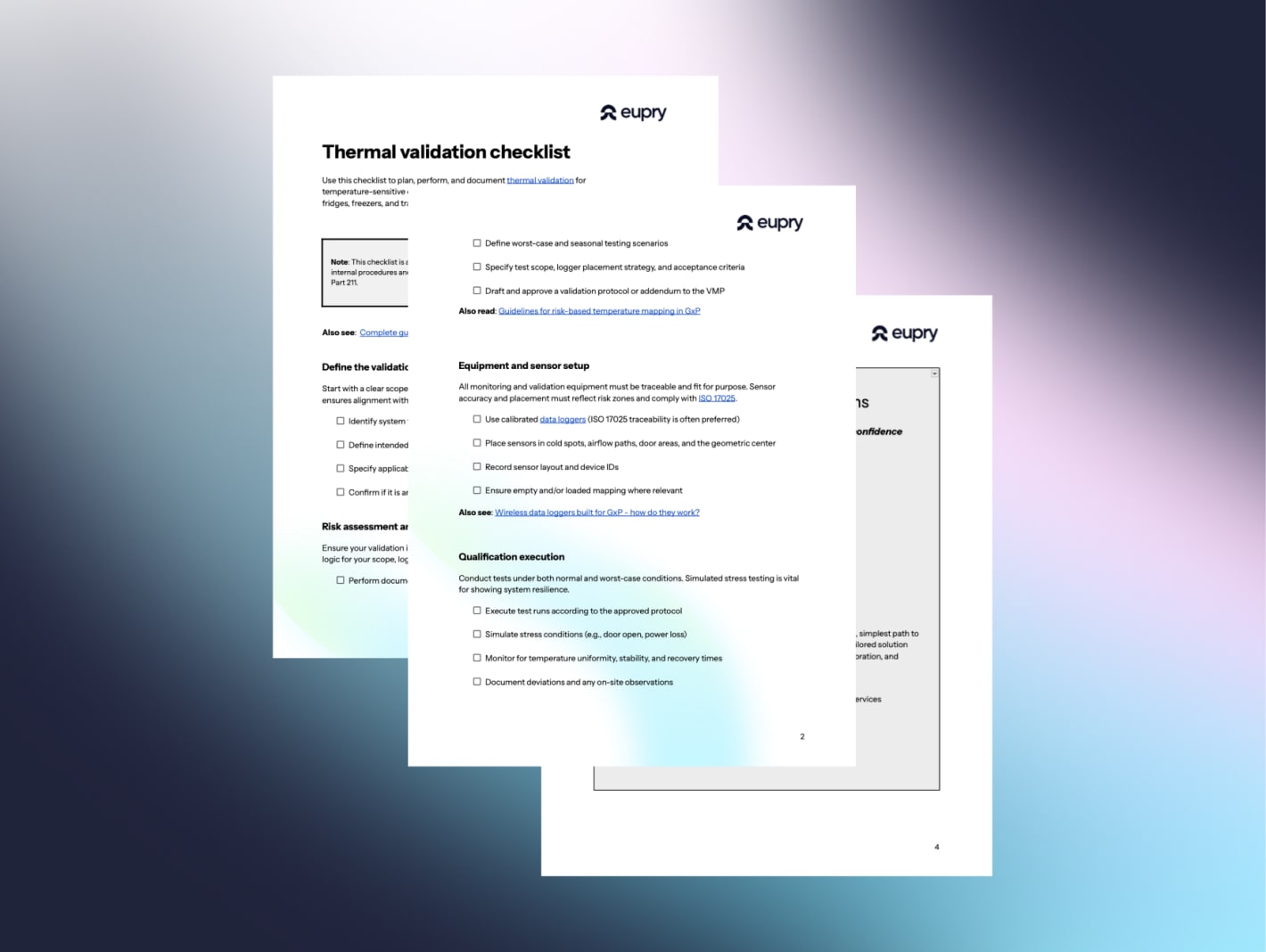What is thermal validation – and when do you need it?

Jakob Konradsen
What is thermal validation? When is it required? And how does it fit into your GxP compliance strategy? Here is everything you need to know about temperature validation.
Get a step-by-step guideline of the steps you need to perform reliable thermal validations.

Also see: Complete guide to thermal validation
What is thermal validation?
Thermal validation is the documented process of verifying that temperature-controlled equipment or environments consistently operate within defined specifications. In pharmaceutical and healthcare logistics, this means confirming and proving that your systems maintain safe, compliant temperatures across worst-case scenarios.
If your product requires storage at 2–8 °C (36–46 °F), thermal validation is what confirms your storage equipment or transport container can reliably hold that range, regardless of weather, location, or load configuration.
The process involves placing calibrated sensors in mapped risk zones, running qualification tests under expected and extreme conditions, and documenting results against defined acceptance criteria. The outcome? Confidence in system performance and documented proof for audits.
Also see: Glossary: The key terms of thermal validation
Why thermal validation matters
In pharma, healthcare logistics, and other regulated industries, products and samples are often highly sensitive to temperature, humidity, or other environmental factors. To protect them – and comply with GxP – it is essential to demonstrate that your equipment and environments can consistently maintain the required conditions.
Thermal validation provides that proof. It confirms that systems meet predefined specifications, perform reliably under stress, and are fully auditable. As such, it is a core requirement for GMP and GDP compliance.
Thermal validation is especially important when:
- Validating new cold rooms, fridges, freezers, or warehouses
- Qualifying temperature-controlled transport containers
- Introducing new product types or packaging
- Replacing, relocating, or upgrading equipment
- Performing seasonal revalidation
Regulators such as the FDA, EMA, and WHO expect a documented, risk-based validation strategy. When properly executed, thermal validation strengthens your compliance posture and helps prevent cold chain failures.
How validation differs from temperature mapping
Temperature mapping is a key part of thermal validation, but they are not the same. Mapping focuses on identifying temperature distribution across a space (where the hot and cold spots are). Thermal validation wraps around that, incorporating the planning, equipment qualification, protocol development, testing, data analysis, and final reporting required to demonstrate compliance.
Learn more: What is the difference between temperature mapping and validation?
Common thermal validation scenarios
- Validating a new storage unit after installation
- Requalifying an existing freezer after repairs
- Testing seasonal performance during summer or winter extremes
- Running validation protocols on a refrigerated delivery van
- Performing validation as part of Good Distribution Practice (GDP) compliance

6-step thermal validation checklist
Get a step-by-step PDF for planning and documenting GxP-compliant validation.
Frequently asked questions about thermal validation
... and their answers.
Thermal validation in 6 steps
Get a free step-by-step checklist to help you plan, execute, and document thermal validation activities in line with GMP, GDP, and audit expectations.

Perform GxP-compliant thermal validation
- in less time, at a lower cost, with full confidence
For the world’s most regulated industries, Eupry delivers the fastest, simplest path to audit-ready storage validation by combining one digital and GxP-tailored solution covering all you need for temperature compliance (monitoring, calibration, and validation).
- From rentable validation kits to on-site/remote services
- ISO 17025-accredited wireless equipment
- Specialized validation software and digital reporting
Get all the technical information and see how the solutions work
